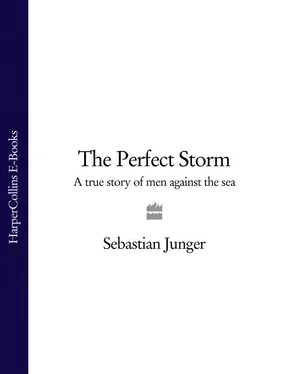SEBASTIAN JUNGER
The Perfect Storm
A True Story of Man Against the Sea

Fourth Estate
An imprint of HarperCollins Publishers Ltd. 1 London Bridge Street London SE1 9GF
www.harpercollins.co.uk
First published in Great Britain in 1997 by Fourth Estate Limited
Copyright © Sebastian Junger 1997
PS Section © Harper Perennial 2006, except ‘Watching the Storm’ by Lucy Miller © Express 2000
PS™ is a trademark of HarperCollins Publishers Ltd
Sebastian Junger asserts the moral right to be identified as the author of this work
A catalogue record for this book is available from the British Library
All rights reserved under International and Pan-American Copyright Conventions. By payment of the required fees, you have been granted the non-exclusive, non-transferable right to access and read the text of this ebook on-screen. No part of this text may be reproduced, transmitted, down-loaded, decompiled, reverse engineered, or stored in or introduced into any information storage and retrieval system, in any form or by any means, whether electronic or mechanical, now known or hereinafter invented, without the express written permission of HarperCollins ebooks
HarperCollins Publishers has made every reasonable effort to ensure that any picture content and written content in this ebook has been included or removed in accordance with the contractual and technological constraints in operation at the time of publication
Source ISBN: 9780007230068
Ebook Edition © AUGUST 2010 ISBN: 9780007324385 Version: 2017-08-22
‘If one knows anything at all about the sea, one feels the enormous strengths of the hurricane winds and the incredibly towering mass of the hundred-foot waves’
PATRICK O’BRIAN
‘Sebastian Jungers compassionate, intelligent voice instructs us effortlessly on the sea life of the swordfisherman, the physics of a sinking steel ship, and the details of death by drowning. It is a terrifying read’
DAVA SOBEL
‘Junger moves seamlessly between the wrenching human dramas and the awesome details of the storm. The Perfect Storm is terrifying, sad, exhilarating, humbling and unforgettable’
Daily Mail
‘Junger has found a language to match the stature of the sea at its worst, and to capture its mysteries … it’s a chilling account that registers 12 on the Beaufort Scale’
Sunday Times
‘A magnificent sea yarn … but a true story and all the more compelling for hat’
Observer
‘Cuts every facet of raw material to flashing brilliance … It amounts to a Homeric epic in its control of overwhelming natural forces and the grim demands they make of human life and effort’
Scotland on Sunday
‘The closest you will come to drowning at sea without actually having to do so’
The Times
‘Sometimes a story comes along that’s almost too good to be believable. The Perfect Storm may read like a novel but it isn’t one. It’s chillingly true … more fabulous than fiction, it will become a classic for a jaded modern world’
Independent
‘Masterly, an essay in fear … He writes like a poet who has been to meteorology school’
RUTH RENDELL, Daily Telegraph
‘Reading The Perfect Storm is like trawling back through every watery dream, and nightmare, you have ever had. It confirms your wildest hopes of quiet heroism as well as your greatest fears’
Independent
Puts the reader in the eye of the storm and into the hearts and minds of all those whose lives were lost or hearts seared by the disaster … the result is total authenticity and perhaps the best writing since Moby Dick on the awesome power, terror and grandeur of the sea and on the character of the people who confront it’
Lloyds List
’ tour de force of descriptive writing … simultaneously thrilling and sobering’
Financial Times
THIS BOOK IS DEDICATED
TO MY FATHER, WHO
FIRST INTRODUCED ME
TO THE SEA.
COVER
TITLE PAGE SEBASTIAN JUNGER The Perfect Storm A True Story of Man Against the Sea
COPYRIGHT
PRAISE
DEDICATION
FOREWORD
GEORGES BANK, 1896
GLOUCESTER, MASS., 1991
GOD’S COUNTRY
THE FLEMISH CAP
THE BARREL OF THE GUN
GRAVEYARD OF THE ATLANTIC
THE ZERO-MOMENT POINT
THE WORLD OF THE LIVING
INTO THE ABYSS
THE DREAMS OF THE DEAD
AFTERWORD
KEEP READING
ACKNOWLEDGMENTS
P.S. IDEAS, INTERVIEWS & FEATURES …
ABOUT THE AUTHOR
ABOUT THE BOOK
READ ON
ABOUT THE AUTHOR
BY THE SAME AUTHOR
ABOUT THE PUBLISHER
RECREATING the last days of six men who disappeared at sea presented some obvious problems for me. On the one hand, I wanted to write a completely factual book that would stand on its own as a piece of journalism. On the other hand, I didn’t want the narrative to asphyxiate under a mass of technical detail and conjecture. I toyed with the idea of fictionalizing minor parts of the story—conversations, personal thoughts, day-to-day routines—to make it more readable, but that risked diminishing the value of whatever facts I was able to determine. In the end I wound up sticking strictly to the facts, but in as wide-ranging a way as possible. If I didn’t know exactly what happened aboard the doomed boat, for example, I would interview people who had been through similar situations, and survived. Their experiences, I felt, would provide a fairly good description of what the six men on the Andrea Gail had gone through, and said, and perhaps even felt.
As a result, there are varying kinds of information in the book. Anything in direct quotes was recorded by me in a formal interview, either in person or on the telephone, and was altered as little as possible for grammar and clarity. All dialogue is based on the recollection of people who are still alive, and appears in dialogue form without quotation marks. No dialogue was made up. Radio conversations are also based on peoples recollections, and appear in italics in the text. Quotes from published material are in italics, and have occasionally been condensed to better fit the text. Technical discussions of meteorology, wave motion, ship stability, etc., are based on my own library research and are generally not referenced, but I feel compelled to recommend William Van Dorn’s The Oceanography of Seamanship as a comprehensive and immensely readable text on ships and the sea.
In short, I’ve written as complete an account as possible of something that can never be fully known. It is exactly that unknowable element, however, that has made it an interesting book to write and, I hope, to read. I had some misgivings about calling it The Perfect Storm, but in the end I decided that the intent was sufficiently clear. I use perfect in the meteorological sense: a storm that could not possibly have been worse. I certainly mean no disrespect to the men who died at sea or the people who still grieve them.
Читать дальше













